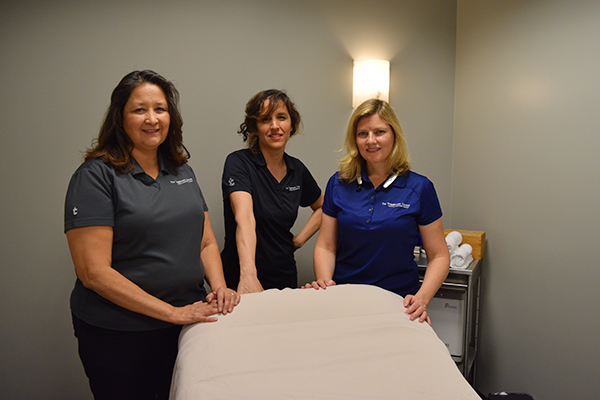
By Larry Kidder | The massage area provides a quiet oasis of relaxation far away from the clatter of cardio machines and weights. Tanya Frederick (center), owner of The Treatment Centre at Loma Linda University Drayson Center, is flanked by fellow massage therapists Lorraine Alfaro (left) and Michelle Casillas (right). For an additional photo, scroll down.
Picture yourself walking along a remote Southern California trail by yourself. You hear a twig snap behind you on the hillside to your left.
Out of the corner of your eye, you see movement. With a slight turn of your head, you realize you are being hunted. A mountain lion crouches perfectly motionless, hoping to blend in with its surroundings—until you look away.
Your body tenses. Your heart races. Your muscles are primed to give you extra strength and speed. You are in fight or flight mode.
When being hunted by a mountain lion, your heightened physical abilities and mental acumen may save your life. The problem is that your daily stressful life can trigger many of the same physical and mental responses over days, weeks, months, and even years.
“If the threat is unremitting, particularly in older or unhealthy individuals, the long-term effects of stressors can damage health,” say authors Neil Schneiderman, Gail Ironson, and Scott
Siegel in the journal Annual Review of Clinical Psychology.
“Following the perception of an acute stressful event, there is a cascade of changes in the nervous, cardiovascular, endocrine, and immune systems,” the article continues. “First, stress hormones are released to make energy stores available for the body’s immediate use.
“Second, a new pattern of energy emerges. Energy is diverted to the tissues that become more active during stress—primarily the skeletal muscles and the brain. Cells of the immune system are also activated and migrate to ‘battle stations.’” This is all great news—if you’re being stalked by a mountain lion. However, the stressors of life—primarily work and family—can cause one’s body to stay in a perpetual fight-or-flight state.
That’s where medical massage at The Treatment Centre, Loma Linda University Drayson Center’s massage provider, comes in. “Stress relief is more than a luxury,” explains Tanya Frederick owner and medical massage therapist. “It can be life-saving.”
Unrelenting stress impacts many normal bodily functions. It can impede digestion and sleep. It can harm the immune system, which stays perpetually ready for attack. The long-term release of stress hormones cause an imbalance in the body that thwarts the production of healthy hormones, even impacting mental health.
“Chronically elevated blood pressure forces the heart to work harder, which leads to hypertrophy [enlargement] of the left ventricle,” Schniederman, Ironson, and Siegel state. “Over time, the chronically elevated and rapidly shifting levels of blood pressure can lead to damaged arteries and plaque formation.”
“A gentle massage helps your body relax from its fight or flight mode,” Frederick suggests. “You are in a safe and supportive environment.”
Massage increases circulation, diffusing stress hormones and increasing the distribution of mood-heightening hormones such as dopamine. Increased circulation also promotes healing and boosts the immune system.
“As we reduce your stress and lower your anxiety, your blood pressure naturally lowers and your heart rate slows,” she describes. “Not only does that improve your mood, but it can lead to deeper and more restful sleep.”
Long-term stress is known to contribute to heightened inflammation throughout the body. “Stress has also been associated with exacerbations [worsening] of autoimmune disease and other conditions in which excessive inflammation is a central feature, such as cardiovascular heart disease,” the authors add.
They continue, “In addition to its effects on physical health, prolonged proinflammatory cytokine production may also adversely affect mental health in vulnerable individuals. During times of illness—e.g. the flu—proinflammatory cytokines [causers of fever, inflammation, tissue destruction, and even shock and death] feed back to the central nervous system and produce symptoms of fatigue, malaise, diminished appetite, and listlessness, which are symptoms usually associated with depression.”
In addition to the benefits already mentioned, medical massage has been shown to …
- Alleviate pain and aid in pain management;
- Provide greater flexibility and range of motion;
- Reduce headaches and migraines;
- Alleviate muscle tension and cramping;
- Support effective digestion and breathing through stimulation of the vagus nerve;
- Increase attentiveness, focus, and learning in both children and adults;
- Improve productivity in the workplace;
- Diminish premenstrual symptoms and menstrual cramping;
- Assist in overcoming addictions;
- Enhance athletic performance; and
- Remove toxins from the body.
As you begin 2018, consider setting aside an hour or two each week to replace your fight-or-flight stress with a relaxing and life-saving massage. To find out more or schedule your stress-reducing appointment at The Treatment Centre, call 909-558-4275 or visit drayson.llu.edu and select “Health and Wellness.”

The Treatment Centre staff work in a quiet environment with two private massage therapy rooms equipped with state-of-the-art, fully adjustable tables by Earthlite. The beds are specially designed to aid those who have difficulty getting on and off the bed, as well as even sitting up. "Most spas don't have such tables," explains Tanya Frederick. "We're blessed here at The Treatment Centre to have such a quiet place and top-of-the-line equipment."
